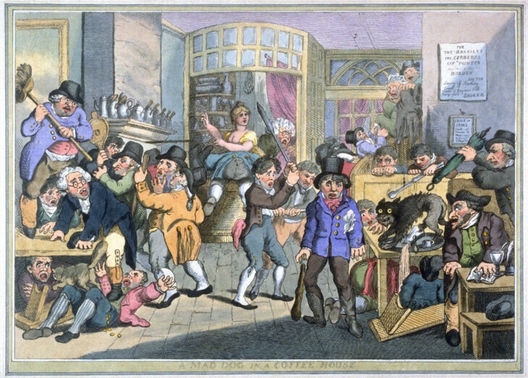 English: "A Mad Dog in a Coffee-House" (1809) by Rowlandson, showing a rabid dog terrorizing a coffee house in 18th century England (possibly Garrison's or Jonathan's, near the Exchange) Such chaos! Such mayhem! Okay, that's all I've got. There's a caricature in here somewhere, but I'd have to do a little research to figure it out. Unfortunately, I don't have the time... Once again, I need to take an extended coffee break, aka temporary blog hiatus. I knew I was having a minor problem when I kept starting posts with no time to finish them.
So I'll be finishing gallons of coffee in my attempt to balance work, teaching and writing...all while doing publicity stuff for A Murder at Rosamund's Gate...did I mention that it's coming out April 23? :-) But I'll be back soon! In the meantime, I'll leave you with the above image as a writing prompt. What's going on here? What schemes are afoot? Or most simply of all, Who let the dog in? Happy writing! 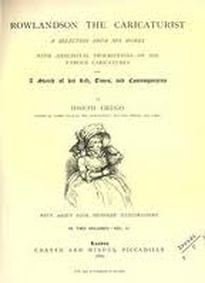 ********************************************** A QUICK EXPLANATION OF THE IMAGE!!! I just had to research the meaning behind this image (despite being on my self-imposed blog hiatus). In doing so, I came across this interesting work by Joseph Grego, who wrote extensively about Rowlandson in 1922. He offers an interesting explanation of the painting that gets at the shifting economic concerns at the time. In his own inimitable words, Grego writes: "March 20, 1809. The advent of a nondescript animal, … assumed to be a ferocious mad dog, has produced the utmost terror and confusion amongst the grave frequenters of a mercantile coffee-house… All the city brokers, and pillars of change found therein are seared out of their sober senses; some…are paralyzed with fear; others are trying to creep under the tables; a few are seeking escape by the door which they are effectually blocking; and groups of affrighted fugitives are endeavoring to gain the refuge of the staircase….Comfortable citizens are thrown on their backs, like turtles, and trodden on, while the pressure of viler bodies above is expressing a stream of specie from the well-filled pockets of the overthrown…." So what does all this mean? Essentially, something seemingly innocuous has pervaded the economy, and it will cause mayhem. The explanation for this mayhem apparently can be found on the advertisment (notice) stuck on the back wall, which offers an important piece of shipping intelligence. The notice warns 'lay off Barking Creek," the location of a large fishing fleet in London. Barking Creek...rabid dog, get it? (but now back to writing!)
8 Comments
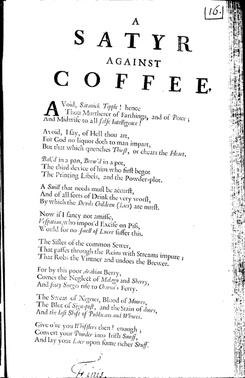 Early hater of coffee. 1674 Wing / 1156:21 As I slip back into my extended coffee break, I will leave you with one more thought about coffee. So as you can probably see by now, coffee was a much disputed drink in the seventeenth-century. Some people championed the drink for its virtues, others for it's "miracles" ("made the corn fall from her lip like a clean acorn!!!"), but many people detested the stuff. Others like "Satyr" the winelover (and how's THAT for a pseudonym?!) were pretty irritated that people were spending their shillings on coffee, instead of England's real mother's milk--ale and wine. To Satyr, drinking coffee was a treasonous act akin to trying to blow up Parliament. But coffee drinkers weren't just traitors, they were godless too. Drinking coffee was pretty much like signing a pact with the devil. According to the "Satyr"... Coffee is "a swill that needs must be accursed, and of all sorts of drink the very worst, by which the devil's children's are nursed." I don't know about you, but I'm ready for another cup. Be back soon! 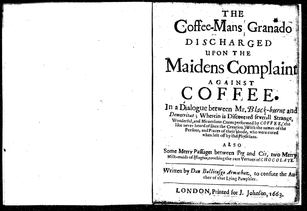 So once again, I need to take an extended coffee break to get started on a new novel. In the meantime, I'll leave you with a description of several miracles attributed to coffee, taken from a 1663 dialogue between "Mr. Blackburnt" and "Democritus." I've discussed the virtues of coffee before, but this time I'll focus on the miracles. In this tract, the two men share "several strange, wonderful and miraculous cures (the like never heard of since the creation!)" brought about by drinking coffee. So after drinking coffee: Helsen, a leather-maker in Dalatia, with a consumption in his eye, became so cured that his "pocket was as bare as a bird's arse." (hmmm...a penny to anyone who can explain what that means!) Calego in Spantego, having been troubled with dimness of sight, "broke his fast with a mess of milk-pottage, and the white of his eyes dropped into the dish" (um, gross?) Anna Marina of Rotterdam saw the corn on her lip, which had long been bothering her, drop from her face like a "clean acorn." (Who needs dermatologists when you have coffee!!!) This just goes to show, when I return from my hiatus and much coffee, I'll be seeing better than ever, with no unsightly blemishes! In the meantime, enjoy your coffee!!!  who are these people anyway One of my favorite past-times is to imagine back stories for the people I see at coffee shops, parks, airports, you name it. I'm always speculating about their personal lives, the secrets they keep, their ambitions--either thwarted or realized. I also like to imagine people in completely different historical contexts. I never make them actual known historical figures, but I might connect them with someone famous. For example, I often look at my eighteen-year old students as World War I soldiers, or the people sipping wine as Macedonians, or the woman strolling down the street as a Druid priestess (not really sure what that looks like though) or the person who cut me off a French aristocrat (sorry about your impending beheading...) One of my friends for sure would be a disguised Han warrior, making tea for her family, then sneaking off to fight the Huns. (Or am I thinking of Mulan?) Another friend would have been an early suffragette, and still another, a village chieftain. A professor I know would have been an Abbott, living a scholarly life in a monastery. And so on. I always imagine my husband as a Viking ship-maker or one of Charlemagne's armor-makers. I wouldn't have met him, unfortunately, as I'd have been a servant in some great English manor or maybe teaching in a one-room schoolhouse on the prairie. Or taking bribes as a Chicago gumshoe. Something like that. A girl can dream. It's fun to speculate what we might have been like 50, 100, 1000, 2000, 10000 years ago! (Cave-man anyone?) Or for that matter, if we lived 5000 years in the future. What about you? How would you imagine yourself in a different time period? 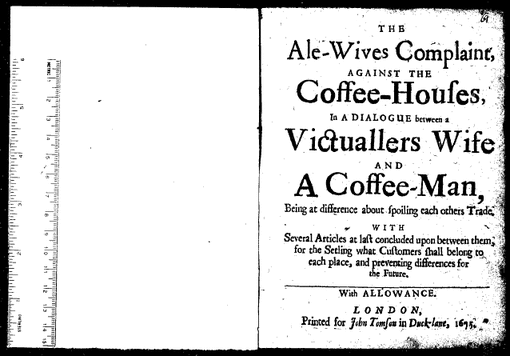 (1675) Wing / 1298:09 O Oh Ale-Wife! Oh, Coffee-Man! Can't we all get along? I promise, I'll divide my time among your fine establishments!
I'll be taking a short break from writing my blog for a while, well, to get some writing done. I'm about halfway finished my copy edits for A Murder at Rosamund's Gate. I'll also be working on the second draft of From the Charred Remains soon, gnashing my teeth over the feedback from my alpha reader. In the mean time, I'll leave you to contemplate how the ale-wife and coffee-man, long embroiled in cantankerous railing (stealing each others' customers!), came to enter a "friendly consultation." The ale-wife promised that "any person being reelingly drunk may be entertained in a coffee-house to make himself sober..." (Essentially, she promised to get her customers as drunk as possible and send them over to the Coffee-House, to improve the coffee man's coffee sales.) Similarly, the Coffee-Man agreed to send any of his customers who were tired of "superior speech" and "prittle prattle" over to the Ale-House. This way, they could get on with the business of "honest drinking." See, everyone wins! All this to say, if you need me, I'll be at the coffee house. Or at a tavern. Or on a seventeenth-century walkabout. (Okay, maybe grading papers. Maybe doing my day job.) Certainly writing. But I won't be on my blog. At least, not for a few weeks. Cheers! 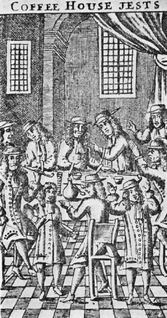 Given that over the last twenty years I’ve spent much of my free time writing in random coffee shops, I thought today I’d say something about The Vertue of the Coffee Drinke, as described by Anonymous in 1652. Coffee had just become popular in England--and its pretty clear why. To benefit fully from coffee, Anonymous tells us how much to drink ("half a pint"), when to drink it ("fasting an hour before, and not Eating an hour after"), and temperature ("to be taken as hot as possibly can be endured," but not so much as to "fetch the Skin off the Mouth, or raise any Blisters.") (I wish I'd learned this last when I first started drinking coffee; I'm fairly certain I don't have front taste buds anymore). Coffee, Anonymous assures us, is good for digestion (being "of great use to be taken about three or four of the Clock in the afternoon, as well as in the morning), will improve our sight ("being very good against sore eyes") and will give us a nice happy buzz ( it will "very much quicken the Spirits, and make the heart lightsome.") This last point might have something to do with how well coffee "suppresseth fumes exceedingly," but I could be wrong. And WAIT! There's more!!! Coffee will prevail against "the Headache," diminish the "deflusion of Rhemes," (whatever that is), and will even prevent consumption and the cough of the lungs. Coffee will prevent dropsy, gout, the scurvy, any running humors, "hypocondriak windes," and, if you were worried, yes, it will even rid you of the "king's evil." You can have your flu shots, your hospitals, your vitamins, and your vaccinations... But I'm sticking with Anonymous and my daily cup of coffee. I'm sure I'll be fine. What do you think? |
Susanna CalkinsHistorian. Mystery writer. Researcher. Teacher. Occasional blogger. Categories
All
Archives
May 2023
|
 RSS Feed
RSS Feed